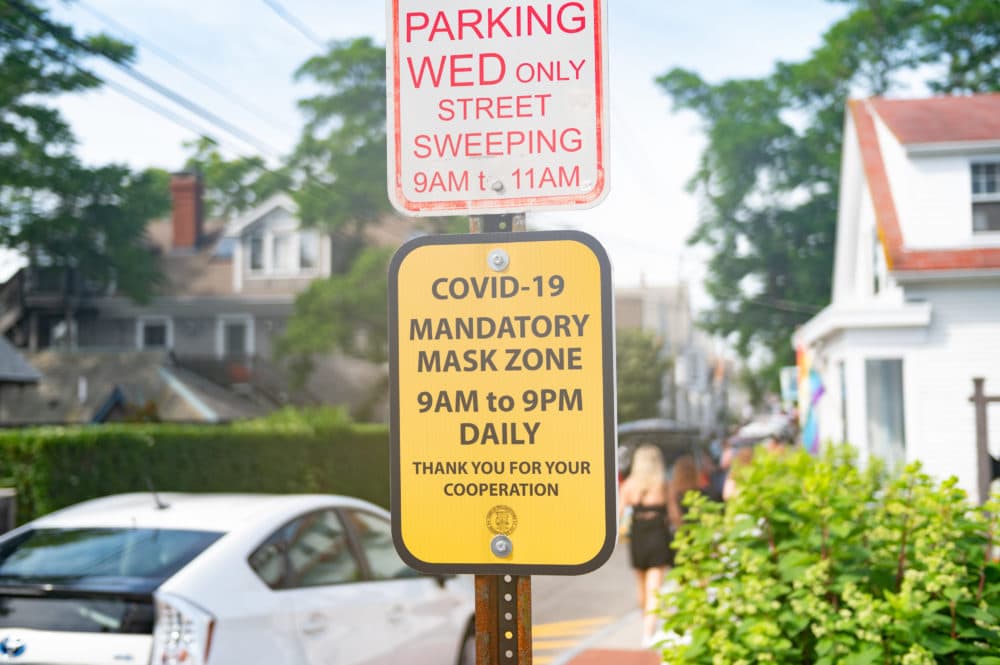Advertisement
Ask The Doctors: New Masking, Delta Variant
Resume
The Centers for Disease Control and Prevention issued new mask-wearing guidance on Tuesday as new COVID-19 cases, particularly cases involving the delta variant, continue to rise.
"In areas with substantial and high transmission, CDC recommends fully vaccinated people wear masks in public indoor settings to help prevent the spread of the Delta variant and protect others," said CDC Director Dr. Rochelle Walensky during a press briefing Tuesday afternoon. "This includes school. CDC recommends that everyone in K-12 schools wear a mask indoors, regardless of vaccination status."
Vaccination rates are below 50% in some communities, even as the Delta variant continues to spread and overall cases spike. And questions are rising now about how to handle schools in the fall, with children under 12 still ineligible for vaccines.
A spokesperson for Gov. Charlie Baker said the administration was "reviewing the new face covering guidance released by the CDC [Tuesday]." Baker had previously said he did not plan to change the state's mask-wearing guidance for places like schools, which were cited directly by Walensky.
Radio Boston spoke with Dr. Cassandra Pierre, acting hospital epidemiologist and an infectious diseases physician at Boston Medical Center, and Dr. Helen Boucher, infectious disease physician at Tufts Medical Center and an interim dean of the Tufts University School of Medicine, to help us make sense of the new guidance and the threat posed by the delta variant.
Below are highlights from their conversation, which have been lightly edited.
Interview Highlights
On their reaction to the CDC news
Pierre: "I think this recommendation does make a lot of sense. I think it can feel like it's giving people whiplash. You know, we've had this brief, wonderful reprieve for those of us who are fully vaccinated, in terms of foregoing masks or at least the option to forego a mask. But as we've seen in the past few weeks, or case numbers are climbing, the delta variant is more highly transmissible and as a consequence, potentially as the collateral damage, we're seeing some more breakthrough infections among those who are fully vaccinated.
"So to be clear, these breakthroughs are more mild infections, but there is some concern about secondary transmission from fully vaccinated individuals as well. And so, given the concern about children going into schools and limiting the amount of transmission even from potentially fully vaccinated individuals, it does make sense, with these numbers, that we're reversing trajectory of bit, even though it does feel like a little bit of whiplash for some."
On what the CDC means when it talks about areas with "high transmission rates," like Bristol and Barnstable counties in Massachusetts
Boucher: "So first and foremost, I just want to emphasize that vaccination is still the most powerful tool we have here. And so we don't want to lose sight of that as we talk about other mitigation measures.
"The fact, as was just mentioned, is that we have seen an uptick in some regions of our state and that according to the our interpretation of what substantial risk means, those two counties may be meeting those criteria. Now, it will be up to Gov. [Charlie] Baker and the Department of Public Health to make the formal recommendations about our actions here in Massachusetts — remember, the CDC guides [and] the state makes the policy. But what it what it tells us is that there is likely substantial spread in our region and that we need to pay attention.
"I think, again, to come back to it. The most important thing is to get those people who are not vaccinated, vaccinated as soon as we can.
Vaccines are the best tool that we have to protect ourselves and our families. they are the reason why we aren't in a much worse situation.
On what they would advise Baker to do in response to the new guidance
Pierre: "Well, I think that the Delta variant is clearly a force to be reckoned with. So in addition to thinking about how we can continue to support vaccination efforts in our entire commonwealth, but especially in those particularly undervaccinated spots that remain vulnerable. Especially as we move into cooler weather, having more indoor teaching and congregation, I would recommend really taking a critical look at the activities that we've seen in our commonwealth and elsewhere contributing to the spread of COVID-19.
"And also, it's really difficult to feel like we're backtracking on the progress that we've made and we're really weary of COVID-19 [but] it's not done with us. And so we really do need to take a hard look and make sure that we are protecting our communities, ourselves, our families and particularly the most vulnerable — including those who are unvaccinated, but children and those who are not eligible for vaccination yet as well.
"But I second my colleague in saying that vaccination really is one of the most important methods that we have at this point. We still need to think as we're getting this vaccination rates up and higher, hopefully, what other layers of infection prevention we've used in the past still work and can work for us moving forward."
On how surprising it is people who are vaccinated may still be contagious and spread the virus to others
Pierre: "I just want to reiterate, you know, the vaccines have been still incredibly effective against the Delta variant and we still see much lower secondary transmission from individuals who are fully vaccinated than from those who are unvaccinated.
"The wrench that has been thrown into our system, unfortunately, is this highly transmissible variant. And it has, you know, a lot of properties that we're learning more and more about. And one of them is obviously it's high transmissibility, and also the potential to emit a lot more viral particles than with the previous variants that we saw.
"And so the properties do lend to the potential of just being exposed to over, you know, a thousandfold more viral particles. And so for individuals, even those who are more fully vaccinated, their viral loads when they are infected or have a breakthrough infection may be higher, even though the vast majority are going to be asymptomatic or have mild infection. But having that higher viral load serves as a risk for others specifically and especially those who are unvaccinated."
On whether there's data that says the vaccines are more or less effective against the delta variant
Boucher: "I think that it's very important that we review every study carefully and there certainly have been studies of individual cases of breakthrough infection that are, you know, really worrisome. And I think it's important for us to understand those and to continue to investigate. But the data that we have that's population based — looking at big groups of people — so far bears out that the vaccines are as effective against the variant as they have been against the wild type or the alpha, earlier strain of the virus.
"And, you know, it does take time... for us to have kind of real time data on what we're seeing here today. But it's quite reassuring when we look at things like mortality data, you know, that doesn't lie. And that should be very, very reassuring and hopefully motivating for those on the fence to really think about going and getting that vaccine now."
This segment aired on July 27, 2021.

